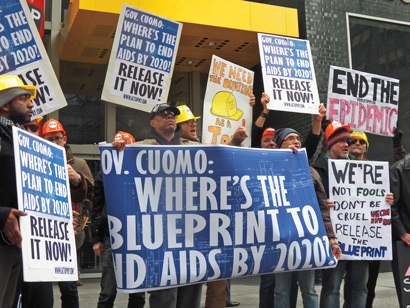 |
| A 2015 protest by ACT UP New York |
When you think of ACT UP (AIDS Coalition to Unleash Power), you probably think of gay men. You probably think of Peter Staley and the others in How to Survive a Plague and think that what they did was all in the past.
When I walked into my first ACT UP New York meeting over two years ago, it was a far cry from the overflowing crowds portrayed in that documentary. Though attendance has steadily risen since then, that day not more than a dozen or so people sat in a circle.
I try to plan my trips from Chicago to New York so I can attend the Monday night meetings at the LGBT Community Center on West 13th Street (everyone’s welcome). Some members have been there since the beginning. Some, like me, burned out on the cause and backed away in the ’90s, only to return when it became clear that the epidemic was far from over. Many of the new members are young, energizing us all.
The men and women come from varying backgrounds, all ages, many ethnic groups. But regardless of education level or tax bracket, they share one thing in common: the desire to put an end to AIDS once and for all.
The introduction of the “cocktail” in 1996 gave me a false sense of security. The urgency was gone, so my work as an AIDS fundraiser wasn’t as critical. My friends weren’t dying; in fact, they were thriving. Pages of obituaries were replaced by pages of ads for the latest HIV drugs. Everything was under control.
In 2011, when I contributed to Windy City Times’ “AIDS@30” series about my experience as a straight woman in Chicago’s AIDS community, I wasn’t prepared for my reaction. The memories, which I’d successfully suppressed for almost 20 years, rushed back. Very few were pleasant. The flood of emotions initially confused me: Where did so much anger come from?
I began to write more about those days and catch up on the current state of the epidemic. Still, it took me two more years to walk into that ACT UP meeting. Though I’ve always been politically active, even lobbying in Washington, DC, for the first Ryan White Care Act, I’d never gotten this involved on the activist side of the epidemic. And let’s face it: I’m not the kind of person who springs to mind when you think of ACT UP.
But then I thought, “Why the hell not?”
I’m humbled by the knowledge base of the members of ACT UP. That’s been one of the hallmarks of the organization from the beginning: Those who advocate must be knowledgeable. They were not going to be (just) angry voices; they would be angry voices who could hold their own in a debate with legislators, bureaucrats, researchers, the media and medical professionals.
Those skill sets are not the sole purview of gay men in New York City. They are the skill sets of men and women everywhere who fight for their lives and the lives of their friends. When I say I’m humbled by their knowledge, it’s because there are moments when I sit in the meetings, struggling to understand a report on complex topics, and wonder what the hell I’m doing there. But I keep going back.
So, back to: “Why I ACT UP.”
I thought I would have a different answer than I had in the 1980s. I assumed marriage, motherhood, and normal aging would create a new reason for why I walked into that meeting. Thirty years later, I have friends who are long-term survivors. I have a gay nephew. But that’s not it.
As it turns out, I ACT UP for the same reason I got involved in the community all those years ago: because I don’t want to look back and wish I’d done something when I had the chance.
If you need a reason to ACT UP, feel free to borrow mine.






Comments
Comments